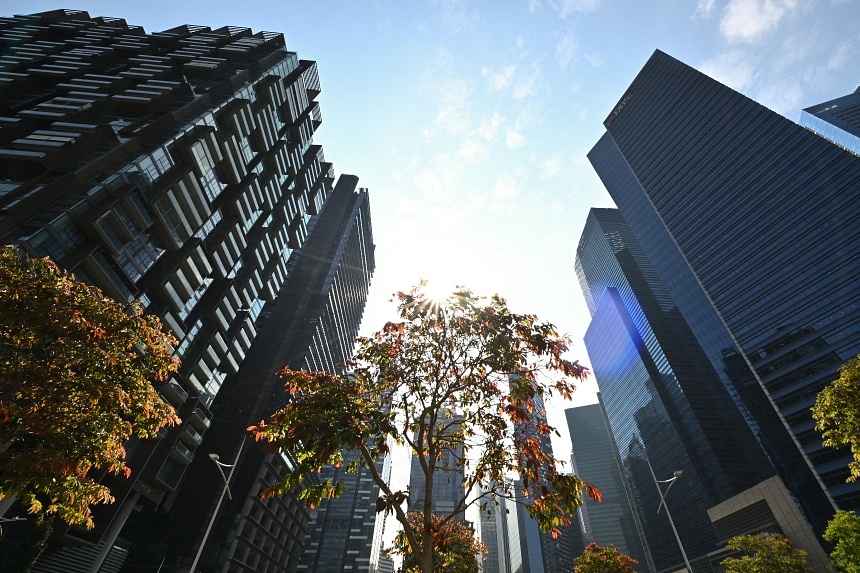SINGAPORE - A requirement for highly energy-intensive buildings to improve their energy efficiency was passed in Parliament on Sept 10.
The changes to the Building Control Act, which will be rolled out in the third quarter of 2025, require owners of such buildings to carry out an energy audit and take action to reduce the energy consumption of their buildings.
These changes will apply to commercial, institutional and sports and recreation buildings, as well as healthcare institutions that have a gross floor area of 5,000 sq m and above.
Fewer than 100 such buildings are expected to come under the first batch of the new Mandatory Energy Improvement (MEI) regime, said Senior Minister of State for National Development Sim Ann.
At present, there are highly energy-intensive buildings that are not required to improve their energy efficiency, as they do not undergo major retrofits or energy-use change, she added.
Under the amendments to the law, owners of these buildings must submit information on their building’s energy use so that the Commissioner of Building Control can assess if the building is energy-intensive and should be subject to the MEI regime.
Ms Sim noted that the Building and Construction Authority (BCA) already collects energy consumption data from these buildings yearly. In practice, building owners will not have new reporting requirements, she added.
The Commissioner of Building Control will also be required to issue an audit notice to owners of energy-intensive buildings, or those that have exceeded the prescribed energy-use intensity threshold for three consecutive years.
These are buildings consistently in the top 25 per cent of their building type in terms of energy consumption.
But the commissioner can cancel the audit notice under certain conditions, such as if a building is scheduled for redevelopment, or if it is undergoing major retrofits or energy-use change.
The amendments to the Act require a building owner to appoint a professional engineer or energy auditor within 90 days of receiving the audit notice.
The auditor has to assess the building’s major energy-consuming systems, such as the chiller and hot water systems, and develop an energy-efficiency improvement plan with recommendations to reduce the building’s energy-use intensity by 10 per cent.
The building owner has to submit the audit report to BCA within a year of receiving the audit notice and roll out the proposed measures within three years of submitting the report. Afterward, the improved energy-use intensity must be maintained for a year.
Ms Sim said the changes to the Act will contribute to efforts to green 80 per cent of buildings by gross floor area by 2030, a target under the Singapore Green Building Masterplan.
As at July, nearly 60 per cent of buildings by gross floor area have met minimum environmental sustainability standards.
Noting that the upfront cost of adopting energy improvement measures may be a concern to building owners, Ms Sim said they should see these as long-term investments. She said building owners should be able to offset the upfront cost of retrofitting works through cost savings over an average of six years.
The MEI regime will also help owners of energy-intensive buildings reduce their electricity consumption, especially as Singapore’s carbon tax is set to rise to $45 per tonne of emissions in 2026, up from $25 per tonne currently, Ms Sim said. The tax will eventually come in at between $50 and $80 per tonne by 2030.
The tax is imposed on power-generation firms and is, in turn, reflected in higher electricity prices.
Ms Sim said the authorities do not specify the types of improvements building owners need to undertake, and they can decide on their course of action as long as the required reduction is met.
Owners who want to meet even higher sustainability standards can tap the Green Mark Incentive Scheme for Existing Buildings 2.0, which provides up to 50 per cent co-funding with various caps, she said.
During the debate on Sept 10, Ms Nadia Samdin (Ang Mo Kio GRC) noted that while building owners can roll out measures for centralised systems, their tenants may have varying levels of energy consumption. She asked if the Government can support building owners in mandating that tenants put in place energy-efficient measures.
In response, Ms Sim said it is the building owner’s responsibility to work with tenants to achieve overall energy-reduction goals.
She added that owners could consider implementing energy-saving policies or sustainability programmes to garner greater cooperation from tenants.
Nominated MP Mark Lee suggested that energy consumption from electric vehicle (EV) charging stations be excluded when assessing a building’s energy-use intensity “to avoid penalising efforts aimed at reducing overall carbon footprints”.
Ms Sim said the authorities have to collect more data on how EV charging contributes to buildings’ energy consumption, adding that this will be considered as the regime is rolled out and refined in the coming years.


